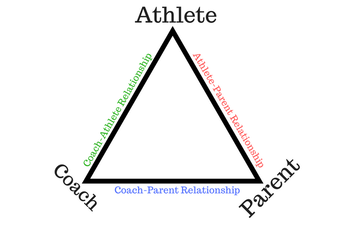"The athlete is always the apex of the pyramid.
The role of the parent and coach is to provide scaffolding and support."
|
Why Your Child Plays Sports
Children have their own reasons for participating in sports and physical activities but coaches and parents are not always in harmony with their motives. Children commonly play sports: • to have fun. • to experience thrills. • to be with friends or make new friends. • to do something they are good at. • to feel good about themselves. • to feel accepted. • to improve and learn new skills. Before you sign up or involve your child in a sport or activity, take time to talk to your child about his or her interests. Children are far more likely to continue in the activity if they are satisfying their own motives and have the support of their parents. They are also more likely to want to achieve excellence in competition for the same reasons. ResourcesAthletics Canada: Long Term Athlete Development Plan
|
Why Parents Encourage Sport
Parents often have their own reasons for seeing their children in sports, and problems arise when their motives conflict with those of their son or daughter. The result can be a very negative sporting experience for the child. Some of the most common problems arise when parents: • place too much emphasis on winning. • push their children to specialize in one sport too early. • live their own dreams through their children. The ideal situation is when your child finds intrinsic reward in participating in the activity – otherwise known as FUN! When the emphasis shifts towards external rewards from parents (extrinsic motives) or being “pushed” to participate, children are far less likely to enjoy and continue in the activity and they become more susceptible to burnout and dropout. ResourcesCanadian Sport for Life: Sport Parent’s Guide
|







